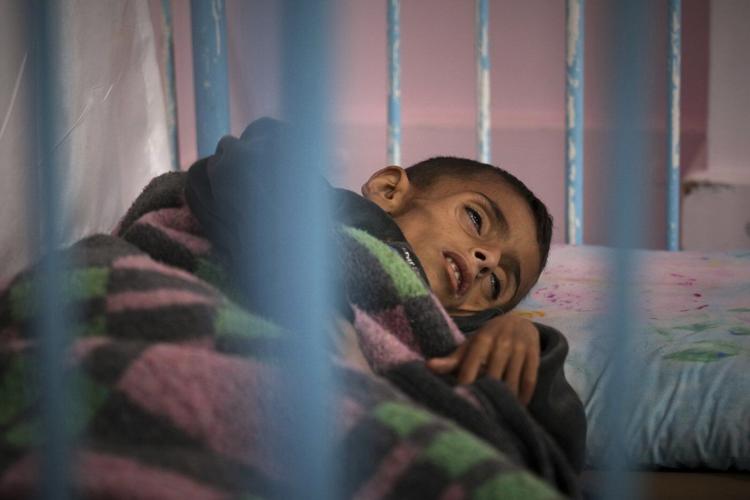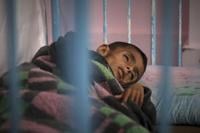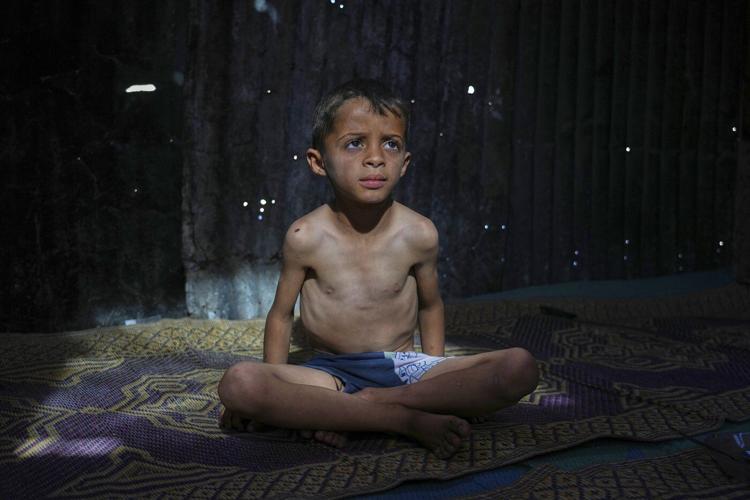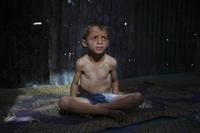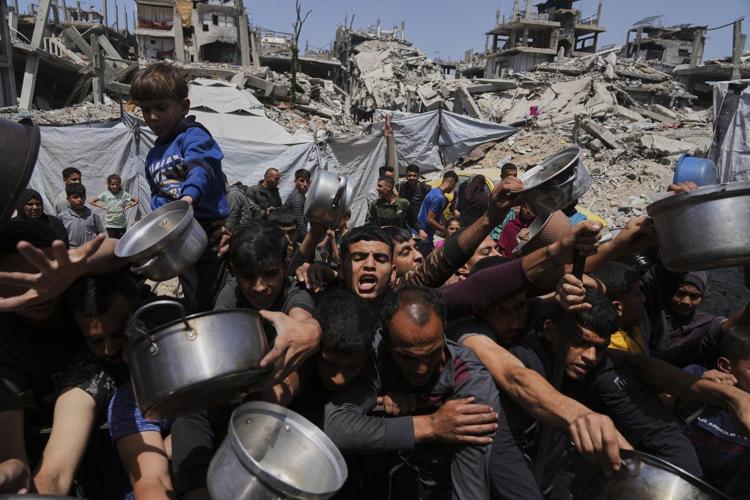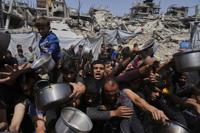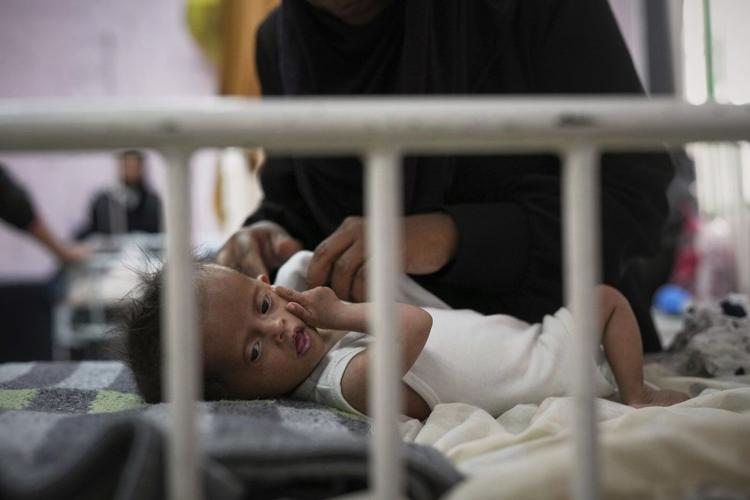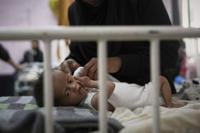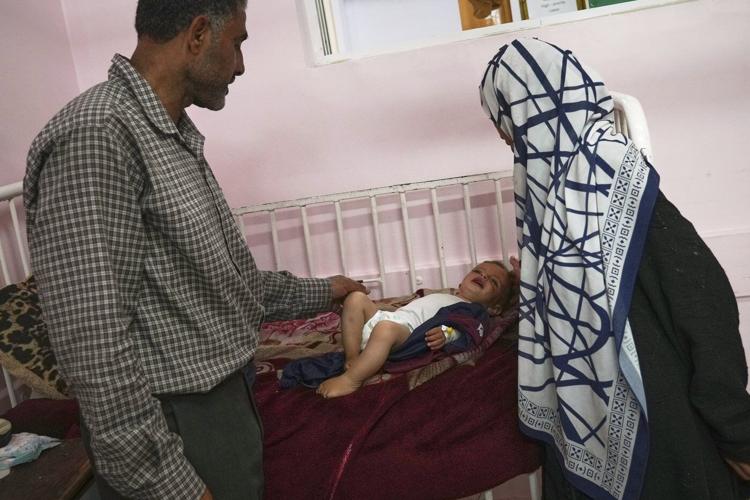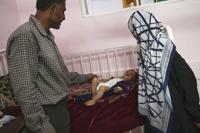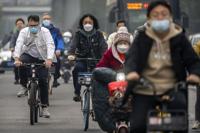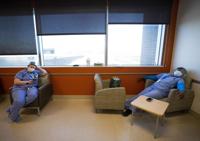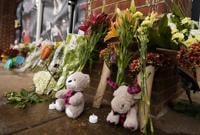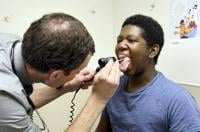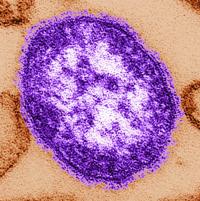KHAN YOUNIS, Gaza Strip (AP) — The little boy is in tears and, understandably, irritable. Diarrhea has plagued him for half of his brief life. He is dehydrated and so weak. Attached to his tiny left hand is a yellow tube that carries liquid food to his frail little system.
At 9 months old, Khaled is barely 11 pounds (5 kilos) — half of what a healthy baby his age should be. And in Gaza's main pediatric hospital ward, as doctors try to save her son, Wedad Abdelaal can only watch.
After back-to-back emergency visits, the doctors decided to admit Khaled last weekend. For nearly a week, he was tube-fed and then given supplements and bottled milk, which is distributed every three hours or more. His mother, nervous and helpless, says that's not enough.
“I wish they would give it to us every hour. He waits for it impatiently ... but they too are short on supplies,” Abdelaal says. “ is destroying us.”
The longer they stay in the hospital, the better Khaled will get. But Abdelaal is agonizing over her other children, back in their tent, with empty pots and nothing to eat as Israel’s enters its third month, the longest since the war started.
Locked, sealed and by Israeli bombings, Gaza is facing . Thousands of children have already been treated for malnutrition. and surviving on basics for over a year and half of war, parents like Abdelaal watch their children waste away and find there is little they can do.
They are out of options.
Acute malnutrition among children is spiking
Hospitals are hanging by a thread, dealing with mass casualty attacks that prioritize deadly emergencies. Food stocks at U.N. have run out. Markets are emptying. What is still available is sold at exorbitant prices, unaffordable for most in Gaza where more than according to the United Nations.
Community kitchens distributing meals for thousands are shuttering. Farmland is mostly inaccessible. Bakeries have closed. Water distribution is grinding to a halt, largely because of lack of fuel. In desperate scenes, thousands, many of them kids, crowd outside community kitchens, Warehouses with few supplies .
The longest blockade on Gaza has sparked a growing , but it has failed to persuade Israel to break open the borders. More groups accuse Israel of using starvation as a weapon of war. Residents and humanitarians warn that among children is spiraling.
“We are breaking the bodies and minds of the children of Gaza," Michael Ryan, executive director of emergencies at the World Health Organization, told reporters in Geneva. "Because if we don’t do something about it, we are complicit in what is happening before our very eyes. ... should not have to pay the price.”
Israel imposed the blockade March 2, then by resuming military operations on March 18, saying both steps were necessary to pressure Hamas into releasing the hostages. Before the ceasefire collapsed, Israel were still inside Gaza, 24 of them alive and still in captivity.
It hasn't responded to accusations that it uses starvation as a war tactic. But Israeli officials have previously said Gaza had enough aid after a surge in distribution during the ceasefire, and accused Hamas of diverting aid for its purposes. Humanitarian workers deny there is significant diversion, saying the U.N. monitors distribution strictly.
A mother wants to help her son — but can't
Khaled has suffered from malnutrition since he was 2 months old. His mother managed it through outpatient visits and supplements distributed at feeding centers. But for the past seven months, Abdelaal, 31, has been watching him slowly shrivel. She, too, is malnourished and has had hardly any protein in recent months.
and two days of labor, Khaled was born — a low-weight baby at 4 1/2 pounds (2 kilos) but otherwise healthy. Abdelaal began nursing him. But because of lack of calcium, she is losing her teeth — and producing too little milk.
“Breastfeeding needs food, and I am not able to give him enough,” she says.
Khaled has four other siblings, aged between 9 and 4. The family has been displaced from Rafah and now lives in a tent further north in Mawasi Khan Younis.
As food ran out under the blockade, the family grew dependent on community kitchens that serve rice, pasta and cooked beans. Cooking in the tent is a struggle: There is no gas, and finding wood or plastic to burn is exhausting and risky.
Ahmed, 7 and Maria, 4, are already showing signs of malnutrition. Ahmed, 7, weighs 17 pounds (8 kilos); his bones are piercing his skin. He gets no supplements at feeding centers, which serve only kids under 6. Maria, 4, has also lost weight, but there is no scale to weigh her.
“My kids have become so frail," Abdelaal laments. “They are like chicks.”
Nutrition centers around Gaza are shutting down
Since March 2, U.N. agencies have documented a rise in acute malnutrition among children. They are finding low immunity, frequent illness, weight and muscle mass loss, protruding bones or bellies, and brittle hair. Since the start of the year, more than 9,000 children have been admitted or treated for acute malnutrition, UNICEF said.
The increase was dramatic in March, with 3,600 cases or an 80% increase compared to the 2,000 children treated in February.
Since then, conditions have only worsened. Supplies used to prevent malnutrition, such as supplements and biscuits, have been depleted, according to UNICEF. Therapeutic food used to treat acute malnutrition is running out.
Parents and caregivers are sharing malnutrition treatments to make up for shortages, which undermines treatment. Nearly half of the 200 nutrition centers around Gaza shut down because of displacement and bombardment.
Meanwhile, supplies are languishing at the borders, prevented by Israel from entering Gaza.
“It is absolutely clear that we are going to have more cases of wasting, which is the most dangerous form of malnutrition. It is also clear we are going to have more children dying from these preventable causes," UNICEF spokesperson Jonathan Crickx says.
Suad Obaid, a nutritionist in Gaza, says parents are frequenting feeding centers more because they have nothing to feed their children. “No one can rely on canned food and emergency feeding for nearly two years."
At Nasser Hospital, four critical cases were receiving treatment last week for acute malnutrition, including Khaled. Only critical cases are admitted — and only for short periods so more children can be treated.
“If we admit all those who have acute malnutrition, we will need hundreds of beds,” says Dr. Yasser Abu Ghaly, acknowledging: “We can’t help many, anyway ... There is nothing in our hands.”
The system for managing diseases has buckled
Before the war, hundreds of families in Gaza were registered and treated for congenital defects, genetic or autoimmune disorders, a system that has broken down mostly because food, formulasor tablets that helped manage the diseases quickly ran out.
Dr Ahmed al-Farrah, head of the pediatrics and obstetrics ward at Nasser Hospital, says hundreds of children with genetic disorders could suffer cognitive disorders as well, if not worse.
“They are sentenced to death,” he says.
Osama al-Raqab’s cystic fibrosis has worsened since the start of the war. Lack of meat, fish and enzyme tablets to help him digest food meant repeated hospital visits and long bouts of chest infections and acute diarrhea, says his mother, Mona. His bones poke through his skin. Osama, 5, weighs 20 pounds (9 kilos) and can hardly move or speak. Canned food offers him no nutrition.
“With starvation in Gaza, we only eat canned lentils," his mother says. “If the borders remain closed, we will lose that too.”
Rahma al-Qadi’s baby was born with Down syndrome seven months ago. Since then, Sama gained little more than half a pound (300 grams) and was hospitalized multiple times with fever. Her mother, also malnourished and still suffering from infection to her wound after birth, continues to breastfeed her. Again, it is not enough.
Sama is restless, doesn’t sleep and is always demanding more food. Doctors ask her mother to eat better to produce more milk.
Lifting Sama’s scrawny legs up, her mother says: “I can’t believe this is the leg of a 7-month-old.”
A father's lament: ‘Waiting for death'
Abdelaal's kids fetch water and wait in line at soup kitchens because she cannot. To get there, they must climb a small hill. When she can, she waits for them at the bottom, fearing they may fall or drop the food.
When they do bring back food, the family divides it over several meals and days. When they get nothing, they share beans out of a can. Abdelaal often surrenders her share. “My kids," she says, "are more deserving.”
Her husband, Ammar, has a heart condition that limits his movement, so he cannot help either. "Because of lack of healthy food, even as adults, we have no energy to move or exert any effort,” Ammar says. “We are sitting in our tents, waiting for death.”
The kids plead for fried tomatoes or cooked potatoes. But produce is unavailable or too expensive. A kilo of each would cost her $21. A bar of biscuits costs $2. Canned sardines cost nearly $10 — a fortune.
“In two years, my child won’t be able to walk because of lack of food,” Abdelaal says.
Smiling through her helplessness, Abdelaal brought Khaled out of the hospital for a few hours to visit his family on Friday. They gathered around a can of cold beans. She wishes Khaled’s doctors could give her the treatment to take back to the tent, so she could be with her family.
“I am exhausted before birth and after birth from lack of food,” she says. “We are not able to live.”

